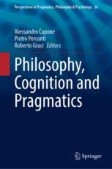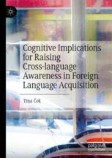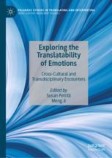Search
Search Results
-
Language, Embodiment and Anomalous Experience
In this chapter, we offer a brief historical review of the sociology of paranormal experience and develop an argument that this traditional approach...
-
On Krifka’s “Nominal Reference, TemporalConstitutionandQuantification in Event Semantics”
Krifka, in his paper “Nominal reference, temporal constitution and quantification in event semantics”, provides the first formal mereological...
-
The Semantics and Pragmatics of Names and Naming
Since at least the time of Apollonius Dyscolus (The syntax of Apollonius Dyscolus, Benjamins, Amsterdam, 1981), On Syntax I: 78 it has been...
-
Recording and Transcription
Naturally occurring data derive from natural and spontaneous interactions, they are real life data. They exist potentially without research or a...
-
Embodied Sense Making
In this chapter, we draw attention to the physical and embodied sensations that are often at the core of paranormal experiences: people report being...
-
Event Knowledge and Verb Knowledge Predict Sensitivity to Different Aspects of Semantic Anomalies in Aphasia
There has been considerable debate as to whether linguistic and world knowledge are dissociable and make distinguishable contributions to language...
-
Satire, Humour, Language and Style in Nigerian Literature
The uncontroverted objective of satire has always been to censor; however, the nature of the language of satire has not always been uncontroverted....
-
Empirical Evidence of Conceptual Discrepancies Between Languages
In this chapter, I assess the classification enhanced and proposed in Chap. 3 by means of an empirical study...
-
The lexical semantics of finite control: A view from Japanese
In this paper, we propose a semantic analysis of control verbs in Japanese that take finite clauses marked by the nominalizer koto . We argue for an...

-
The indexical character of epistemic modality
We assume a central thesis about modal auxiliaries due to Angelika Kratzer, the modal base presupposition: natural language expressions that contain...

-
What’s in the bucket? Aspectual (non)compositionality in phrasal idioms
I consider here the question of whether the aspectual properties of idioms are compositionally determined with respect to the normal literal meanings...

-
What Is That?
In this chapter, we provide examples of the ways in which people come to interpret anomalies in their environment as having uncanny or other-worldly...
-
“Shamuz, Shamuz, Everything Is with Shamuz”—Making Sense of Humour Theory and Stylistic Enquiry: An Overview
One of the famous examples of humour causation by Henri Bergson, a nineteenth-century French philosopher of humour, is that of a man running in the...
-
When Mechanical Computations Explain Better
In this paper I defend the epistemic value of the representational-computational view of cognition by arguing that it has explanatory merits that...
-
The (Absent) Body in Research on Paranormal Phenomena
In this chapter, we reflect on the relative absence of academic study about the body in paranormal research and outline an argument for its...
-
“Where All the People are Fantastical and Magical”—and Hurting: Intergenerational Trauma and Social-Emotional Learning in Encanto
This essay argues that, together with presenting a multigenerational family, Disney’s Encanto explores the issue of intergenerational trauma. The...
-
The Vocalic Ambinyms: Pronouncing Ay as /e/, Ee as /i/ and I as /aɪ/ but Oh as /o/ and Yue as /ju/
The pronunciation and spelling of English vowels is mercurial. This chapter focuses on the behavior of our vowel letters by concentrating three...
-
Toward a Unified Linguistic Approach to Conditionals—Some Empirical Evidence
This paper reappraises Greenberg’s Universal of Word Order 14 concerning the linear order of the two clauses in a conditional construction. It also...
-
Saving-Face: The Nonverbal Communicology of Basic Emotions
Emotion displays on your face are an iconic sign of comportment—your disposition to act in a particular way. Most importantly, these nonverbal...
-
The Semantics/Pragmatics Interface
This chapter highlights some critical points of the ongoing semantics/pragmatics debate. Recent developments in the philosophy of language have...
